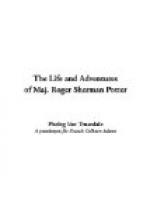The critical condition in which I left the major renders it imperative that I should return to him without further delay. And I must here say, then, in restoring him to consciousness, that much ice water was used, a portion of his hair and beard was shaved off, and sundry aromatic liquids applied to counteract an odor that was by no means delightful to the senses. And when he had recovered sufficiently to sit up, his eyes were fixed confusedly upon those about him; then his hands wandered to his haunches, and he heaved a deep sigh. “Pray tell me, gentlemen, (for I seem to have just come out of a trance,) what has befallen me? Pray tell me, gentlemen, that I may offer you such an apology as becomes my position, for I am in a condition no man need envy. And to lose a hard earned reputation so easily is no trifling thing.” The commodore was struggling to suppress his laughter, which had been excited by the forlornness of the figure before him. He however begged the major to be composed. As to losing his reputation by so trifling an accident, he enjoined him not to think of it, since history afforded numerous instances of great heroes who had met with similar ones. In truth, it was just such an accident, taking place on the commencement of a great battle, that saved General Cushing from the bullets of the enemy, and his life to the country! And this timely accident I record here for the benefit of that admiring generation which is yet to come, and which might be deceived by that worthy historian, the author of “The Mexican War,” who recorded with so much faithfulness all his gallant deeds, and hanged himself when he had finished. Hearing this, he at once took heart, and declaring that it was all owing to a derangement of the stomach, said, that although it was the first time in his life that he had ever met with such an accident, he had not the slightest doubt of its influence for good, since a man’s virtues lay in his power to bear up under such trials.




